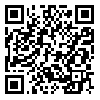Volume 1, Issue 2 (7-2014)
Human Information Interaction 2014, 1(2): 105-117 |
Back to browse issues page
Abstract: (8042 Views)
Background and Aim: Collaborative information behavior (CIB) is strongly affected by contextual factors and in different contexts we can see various aspects of collaborative information behavior. In this study, we investigate the triggers and barriers of collaborative information behavior in an educational-medical context in Iran.
Method: This qualitative research uses grounded theory as research method. Semi-structured interviews were conducted with twenty physicians (in Fellowship and Residency stages) in Shahid Beheshti University of Medical Science.
Results: the findings indicated that five main factors trigger collaborative information behavior, including lack of domain expertise, lack of time, information scatter, complexity of information needs and lack of immediately accessible information. The barriers that hinder collaborative information behavior in this context fell under five categories, technological, individual, team, educational structure and cultural barriers. Some of these triggers and barriers have identified in previous researches in different contexts.
Conclusion: the results of this study showed that Lack of time was strongest trigger of CIB in physicians (in fellowship and residency stages). Then complexity of information needs, lack of domain expertise, information scatter and lack of immediately accessible information were the triggers that identified in this study. Also barriers that identified in this context are so important. In order to promoting CIB in this context the barriers should be analysed and resolved.
Method: This qualitative research uses grounded theory as research method. Semi-structured interviews were conducted with twenty physicians (in Fellowship and Residency stages) in Shahid Beheshti University of Medical Science.
Results: the findings indicated that five main factors trigger collaborative information behavior, including lack of domain expertise, lack of time, information scatter, complexity of information needs and lack of immediately accessible information. The barriers that hinder collaborative information behavior in this context fell under five categories, technological, individual, team, educational structure and cultural barriers. Some of these triggers and barriers have identified in previous researches in different contexts.
Conclusion: the results of this study showed that Lack of time was strongest trigger of CIB in physicians (in fellowship and residency stages). Then complexity of information needs, lack of domain expertise, information scatter and lack of immediately accessible information were the triggers that identified in this study. Also barriers that identified in this context are so important. In order to promoting CIB in this context the barriers should be analysed and resolved.
Type of Study: Research |
| Rights and permissions | |
 | This work is licensed under a Creative Commons Attribution-NonCommercial 4.0 International License. |



